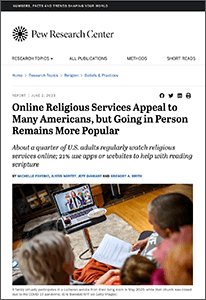A recent survey by Pew Research Center found that about a quarter of U.S. adults regularly watch religious services online or on TV, and most of them are highly satisfied with the experience. At the same time, Americans tend to give even higher marks to worshipping together in person. And those who do both — who watch services on screens and attend in person — overwhelmingly say they prefer going in person.
It’s been clear for more than two years that the video technology that helped Americans stay in touch with relatives, friends, and colleagues during COVID-19 lockdowns also helped many to connect with houses of worship. What wasn’t clear, though, was how people felt about these virtual experiences. Would they keep watching services on screens, even after they thought it was safe to attend in person? What did they like about joining services remotely? What didn’t they like? A new survey from Pew Research Center sought to address these questions.
The survey of more than 11,000 U.S. adults conducted Nov. 16–27, 2022, found that about a quarter of U.S. adults regularly watch religious services online or on TV, and most of them are highly satisfied with the experience. Two-thirds of U.S. adults who regularly stream religious services online or watch them on TV say they are either “extremely satisfied” or “very satisfied” with the services they see.
At the same time, Americans tend to give higher marks to worshipping together in person. While majorities express satisfaction with virtual services, even bigger shares of physical attenders say they feel extremely or very satisfied with the sermons (74%) and music (69%) at the services they attend in person.
Those who do both — who watch services on screens and attend in person — overwhelmingly say they prefer going in person, by a margin of 76% to 11%. An additional 14% say they have no preference.
In addition, virtual viewers are much less likely to report feeling connected to other worshippers. Roughly two-thirds (65%) of regular in-person attenders say they feel “a great deal” or “quite a bit” of connection with their fellow attenders, the two highest options on a five-point scale. On the other hand, only 22% of regular virtual viewers say they feel strongly connected to the other people watching online or on TV.
The survey also asked respondents whether they use online apps or web-based technology for religious purposes other than virtual services. Overall, three-in-ten U.S. adults say they go online to search for information about religion. Roughly two-in-ten say they use apps or websites to help them read scripture or to remind them to do so, including 9% who do this daily. A similar share (20%) say they watch religion-focused online videos, such as those found on YouTube or TikTok.
Americans who belong to historically Black Protestant denominations are more frequent watchers of religious services online. About six-in-ten adults in historically Black Protestant denominations (58%) say they generally watch religious services on screens at least monthly or watched them in the month prior to the survey. This compares with 47% of evangelicals, 28% of mainline Protestants, 24% of Catholics, and 19% of Jews.
Other key findings include:
- Overall, 17% of U.S. adults say they share content about religion on social media. Roughly one-in-ten (11%) say they have posted a prayer request, while about four-in-ten (42%) have seen someone else’s prayer request online. Meanwhile, 17% of Americans say they have unfollowed, unfriended, or blocked a person on social media, or changed their social media settings to see less of a person, due to religious content they posted. And 3% say that someone else has done this to them online.
- U.S. adults use apps and web-based technology to engage with religion in ways other than just watching virtual services. Some 15% of U.S. adults say they listen to religion-focused podcasts. A similar share (14%) say they use apps or websites to help o remind them to pray, including 8% who use prayer apps or sites daily. Fewer than one-in-ten (7%) say they participate online in prayer groups, Bible study groups, or religious education programs.
- Adults in historically Black Protestant denominations and evangelical Protestants are more likely to be “heavy users” of religious technology than those from other major religious groups. Based on a scale Center researchers developed to measure Americans’ religion-related technology use, 37% of adults in historically Black Protestant churches and 28% of evangelical Protestants are considered heavy users of religious technology. By comparison, roughly one-in-ten Catholics, mainline Protestants, and Jews are heavy users of religious technology (12% of each group).
- Irrespective of religious denomination, Black Americans stand out as generally more engaged with digital technology in their religious lives. For example, 48% of Black adults say they watch religious services online or on TV at least monthly, or that they did so in the month prior to the survey. That is more than twice the share of White adults (22%) and higher than the share of Hispanic adults (30%) who regularly join religious services remotely.
- Convenience is the most commonly chosen reason for attending virtual religious services out of six possible reasons provided in the survey. More than four-in-ten regular watchers (43%) say convenience is a major reason they watch services on screens. The next most-cited major reason is being able to watch services that are far from their home (34% say this).
These are among the findings from the new report, which is based on a survey of 11,377 respondents. The margin of sampling error for the full sample is plus or minus 1.4 percentage points.
 This material is reprinted with permission from Pew Research Center. Read the full report.
This material is reprinted with permission from Pew Research Center. Read the full report.
Related Resources
- Reaching People Here and There, Now and Later through Hybrid Worship featuring Jason Moore — Leading Ideas Talks podcast episode | Video podcast | In-depth interview
- 10 Ways to Engage People Who Worship Online by Jim Keat
- How Has COVID-19 Impacted Religious Participation? by Amy Kubichek






